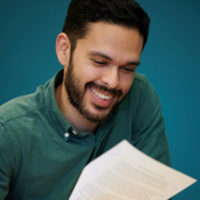Alumni Spotlight
He Speaks Their Language
A second-year student connects with underserved communities through a summer rural studies program.
 Antonio Guadamuz knows exactly what racism looks and feels like.
Antonio Guadamuz knows exactly what racism looks and feels like.
It’s the open stares in grocery stores. It’s the awareness of being followed by store employees while doing your shopping. And, unfortunately, it can lead to difficulty in getting a correct diagnosis when you’re sick. That’s what drew the 33-year-old to medical school.
“Five years ago, I was diagnosed with type 1 diabetes, but it was a circuitous, complicated process because as a person of color, they assumed I had type 2 diabetes,” says Guadamuz, who was born in Nicaragua. Current medical algorithms, he says, indicate Hispanics are at greater risk of developing the type 2 form of the disease.
The frustration he experienced as a patient propelled him toward a career as a physician. “I see the potential to address the inadequacies in society,” he says. “Medicine meshes with my world view and ideals about what I want to do with my life.”
At the end of his first year at the University of Washington School of Medicine (UWSOM) in Seattle, Guadamuz had the opportunity to participate in a summer training program known as the Rural Underserved Opportunities Program (RUOP). It’s open to all medical students between their first and second years of medical school.
During the four-week summer program, students live in rural underserved communities, working alongside local physicians in hospitals, clinics and private practices. “Our students develop a profound appreciation of what life is like for physicians practicing rural medicine,” said John McCarthy, MD, assistant dean for rural programs at the University of Washington School of Medicine.
Guadamuz served in Brewster, Washington (population 2,300), working with James Wallace, MPH, FAAFP, at Family Health Centers.
“We serve all of Okanogan County and part of North Douglas County,” says Wallace, who is the medical director of Family Health Centers. “Brewster’s population doubles in size during harvest season. We have a huge influx of migrant workers from Mexico, Central America and even Jamaica. It adds a unique flavor to the cultural melting pot of the town.”
Wallace was delighted to work with Guadamuz. “Antonio is one of the best students I’ve had,” says Wallace. “He was thirsty for experience and very intentional in the clinical skills he wanted to learn.”
While Wallace learned Spanish during his residency, he said watching Guadamuz converse easily with patients was eye-opening. “Seventy-five percent of my patients speak Spanish. They really appreciate someone who speaks their language,” he says. “Because Spanish is his first language, Antonio could convey empathy, humor and a depth of cultural understanding that I can’t. Seeing him work with our Spanish-speaking patients was an experience that drove that home for me.”
Guadamuz was glad to be of service while he was learning about rural medicine. “I really enjoyed my time and training in Brewster. It’s a beautiful area,” he says. “I received a great clinical education, and I was able to use Spanish frequently to help patients feel more comfortable.”
But because of earlier small-town experiences, Guadamuz had some reservations. “I was apprehensive about being in a rural, conservative area,” he says. “I’d already experienced stares and being followed in stores in my travels to smaller communities throughout the state. Rural areas often feel like unsafe, unwelcoming places for people of color.”
It’s a conundrum McCarthy, as the assistant dean for rural programs, is well aware of. “Our goal is to develop students into physicians who appreciate and respect diversity,” says McCarthy. “At the same time, it’s important to cultivate a workforce that mirrors the populace of the communities we serve. I’ve seen patients light up when they see a provider who mirrors their culture and experiences.”
However, attracting minority physicians to places they may feel unwelcome can be difficult. Wallace says conversations with medical students like Guadamuz are an important place to start.
“Antonio helped me to recognize my own deficiencies and to explore ways to make up for them,” Wallace says. “Traditionally, the best healthcare wasn’t available to people of color, which led to worsening health outcomes. We’re trying to hire health workers who are part of these communities to provide feedback about how to better serve our patient population.”
Guadamuz says he didn’t feel unwelcome everywhere he went. Patients felt at ease with him, and the medical staff was open to important dialogue. “Racism is an uncomfortable topic,” he says. “But it’s an uncomfortable experience, too, and it’s important to keep talking about it.”
Guadamuz appreciated the chance to observe how Family Health Centers is actively meeting the needs of the communities it serves. “When you are among only a handful of doctors in a small town, it’s important to build long-term relationships with patients,” Guadamuz says. “That was a key takeaway from my RUOP experience.”
His hope is that conversations about discrimination will become part of a larger conversation that centers on the voices of the people who are most marginalized. Wallace agreed, citing the critical need for physicians who fit their cultural population.
“Antonio gives me hope that there are students out there who are endeavoring to explore rural areas despite the expectation that they might experience racism,” he says. “I appreciate that through RUOP and other rural programs, UWSOM is addressing two of the most vexing problems facing our society — racism and improving the physician workforce in underserved areas of our state.”
Guadamuz feels it’s too early in his medical education to know what type of medicine he will one day practice, or where he and his family will settle. But he does know that he’ll continue to focus on healthcare equity.
“Wherever I practice, I hope to have real conversations about how to address inequities in health care and how physicians can better meet the needs of the entire community,” says Guadamuz.
By Cindy Hval

